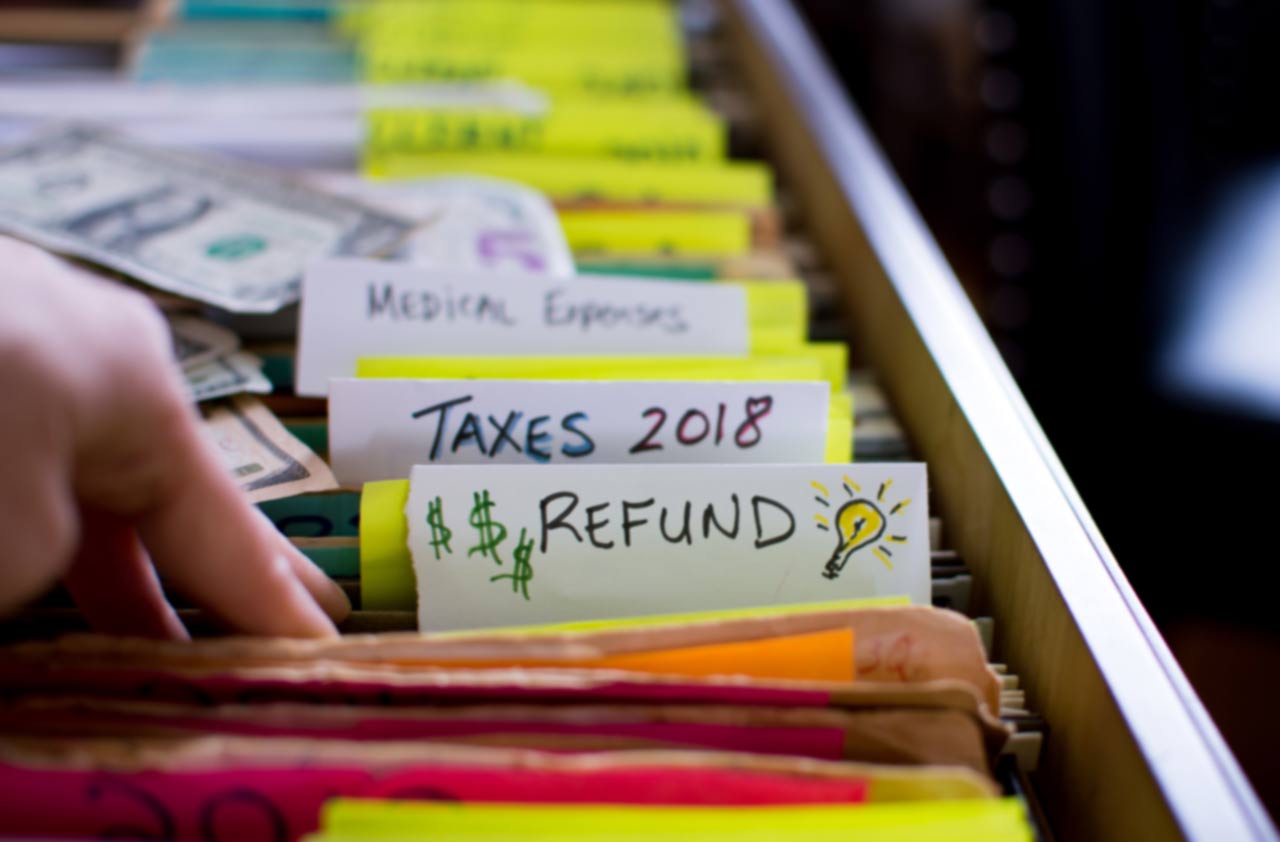4 Things You Should Know Now to Save on Taxes Later
Every money move you make (or that you fail to make) has potential tax consequences, either now or down the road. Take some actions today to put yourself in a better position for the long term.


Profit and prosper with the best of Kiplinger's advice on investing, taxes, retirement, personal finance and much more. Delivered daily. Enter your email in the box and click Sign Me Up.
You are now subscribed
Your newsletter sign-up was successful
Want to add more newsletters?

Delivered daily
Kiplinger Today
Profit and prosper with the best of Kiplinger's advice on investing, taxes, retirement, personal finance and much more delivered daily. Smart money moves start here.

Sent five days a week
Kiplinger A Step Ahead
Get practical help to make better financial decisions in your everyday life, from spending to savings on top deals.

Delivered daily
Kiplinger Closing Bell
Get today's biggest financial and investing headlines delivered to your inbox every day the U.S. stock market is open.

Sent twice a week
Kiplinger Adviser Intel
Financial pros across the country share best practices and fresh tactics to preserve and grow your wealth.

Delivered weekly
Kiplinger Tax Tips
Trim your federal and state tax bills with practical tax-planning and tax-cutting strategies.

Sent twice a week
Kiplinger Retirement Tips
Your twice-a-week guide to planning and enjoying a financially secure and richly rewarding retirement

Sent bimonthly.
Kiplinger Adviser Angle
Insights for advisers, wealth managers and other financial professionals.

Sent twice a week
Kiplinger Investing Weekly
Your twice-a-week roundup of promising stocks, funds, companies and industries you should consider, ones you should avoid, and why.

Sent weekly for six weeks
Kiplinger Invest for Retirement
Your step-by-step six-part series on how to invest for retirement, from devising a successful strategy to exactly which investments to choose.
With 2018 taxes hopefully behind you, probably the last thing you want to think about is what taxes may look like in 2019 and beyond.
I get that.
But you should be thinking about it. Right now, and every time you ponder making a change to your retirement portfolio. Because a tax-efficient financial plan — one that considers the potential savings you could get over a lifetime instead of just going year-to-year — can make all the difference in the health of your nest egg.
From just $107.88 $24.99 for Kiplinger Personal Finance
Become a smarter, better informed investor. Subscribe from just $107.88 $24.99, plus get up to 4 Special Issues

Sign up for Kiplinger’s Free Newsletters
Profit and prosper with the best of expert advice on investing, taxes, retirement, personal finance and more - straight to your e-mail.
Profit and prosper with the best of expert advice - straight to your e-mail.
Here are four things I wish people knew about managing their taxes now and in retirement.
1. We have a limited window of opportunity.
2018 was the first year we filed our taxes under the new tax law. While there are certainly some personal details that determined whether you paid more or less taxes than in the past, one change every taxpayer benefited from was the lower tax rates. As the law stands, those lower rates are set to expire Dec. 31, 2025. However, many professionals believe that depending on the results of the election in 2020, taxes may increase before 2026, and when they do increase, they will not JUST go back to where they were in 2017 but potentially much higher. Thus, for many people, the tax rates we see over the next several years may be the lowest rates we see for quite some time.
2. It’s important to stay focused on the big picture.
I’ve seen people scramble to earn an extra half to 1% return on an investment, only to lose what they gained — and more — because they weren’t paying attention to how that product, account or strategy would be taxed. A 6% rate of return that’s tax-free will net you more than an 8% rate of return that’s taxable. Over a couple of years, it’s no big deal. But over decades, that’s a lot of money you could be leaving on the table. Depending on the size of your portfolio, taxes can represent a significant expense. Combined with inflation, they can eat away at the retirement income you expect to draw.
3. It’s never too late to include some tax-free income sources in your portfolio.
- If you open a Roth IRA, the money you contribute can grow completely tax-free as long as you follow certain rules. And — unlike with traditional IRAs, which close the door to new contributions once you turn 70½ — for Roth IRAs, there are also no contribution limits based on age. So even if you’re 75 and want to keep putting money in, you can. Keep in mind there are earned income rules for Roths, however. If you are doing Roth conversions, you can do those at any age and any amount, so you are in complete control. Furthermore, there are no required minimum distributions (RMDs) at 70½. And because your withdrawals won’t count toward your annual income, you’re less likely to have to pay taxes on your Social Security benefits or a higher premium for Medicare Part B in retirement when taking distributions from a Roth IRA vs. a traditional IRA. (For more on Roth rules, see How Much Can You Contribute to a Roth IRA for 2019?)
- You could invest in municipal bonds, which provide income that’s free from federal taxes. The current drawback, of course, is that interest rates are still low. And in a rising-interest-rate environment, bonds tend to lose value. Also, although the income from your bonds won’t be taxed, it can still cause your Social Security to be taxed.
- Depending on your taxable income, your qualified dividends and long-term capital gains won’t be taxed. For the 2019 tax year, your tax rate is zero if your income threshold falls below $78,750 and you’re married filing jointly, $52,750 and filing as head of household, or $39,375 if filing as single or married filing separately.
4. It isn’t just what you invest in, it’s also how you diversify your accounts and manage your tax bracket.
you and your spouse earned pension checks, maximized your Social Security benefits and diligently contributed to your IRAs, your retirement income could be higher than you expected. If you manage your tax bracket throughout your life, you won’t get hit with a ticking tax time bomb in retirement. There are four distinct time periods to be aware of:
- When both you and your spouse are still working. These are your high-income years, so it makes sense to contribute to a tax-deferred retirement savings account (a 401(k), traditional IRA, etc.) to lower your tax bill. But you also should be looking at taxable and after-tax accounts.
- When you’re between retirement age (over 60) and age 70½. These are the years when retirees usually have the most control over their income. It may be a good time to start withdrawing from a tax-deferred account (penalty-free) and pay taxes on that money.
- When you turn 70. Get ready to lose some of that control. At 70, you’ll have to file for your Social Security benefits (if you haven’t already done so) and, ready or not, you must begin taking RMDs from your tax-deferred retirement accounts at 70½. Your income could rise again.
- When you’re widowed. A surviving spouse must file income taxes as single, which means higher tax tables and a lower standard deduction. Your income may drop, but your taxes still could go up.
The Individual tax season for 2018 is largely over, which makes this a good time to talk to your tax professional and financial adviser about what you should do to minimize your taxes in retirement. You’ll get their complete attention; hopefully they’ll have changed their mindset to be looking at the future opportunities offered by the tax reforms vs. just focusing on how to save a dollar today. By starting now, you’ll have plenty of time to make any changes you feel would improve your tax status in the future.
Kim Franke-Folstad contributed to this article.
The appearances in Kiplinger were obtained through a PR program. The columnist received assistance from a public relations firm in preparing this piece for submission to Kiplinger.com. Kiplinger was not compensated in any way.
Profit and prosper with the best of Kiplinger's advice on investing, taxes, retirement, personal finance and much more. Delivered daily. Enter your email in the box and click Sign Me Up.

Michael Neuenschwander, one of the founders and owners of Outlook Wealth Advisors, is a CPA and CERTIFIED FINANCIAL PLANNER® (CFP®) professional. His holistic, in-depth planning approach covers as many situations as possible to help create retirement strategies that address a variety of potential risks and taxes and provide sustainable income streams throughout retirement. Michael has a bachelor's degree in accounting and a master's degree in finance from Texas A&M University.
-
 5 Vince Lombardi Quotes Retirees Should Live By
5 Vince Lombardi Quotes Retirees Should Live ByThe iconic football coach's philosophy can help retirees win at the game of life.
-
 The $200,000 Olympic 'Pension' is a Retirement Game-Changer for Team USA
The $200,000 Olympic 'Pension' is a Retirement Game-Changer for Team USAThe donation by financier Ross Stevens is meant to be a "retirement program" for Team USA Olympic and Paralympic athletes.
-
 10 Cheapest Places to Live in Colorado
10 Cheapest Places to Live in ColoradoProperty Tax Looking for a cozy cabin near the slopes? These Colorado counties combine reasonable house prices with the state's lowest property tax bills.
-
 Don't Bury Your Kids in Taxes: How to Position Your Investments to Help Create More Wealth for Them
Don't Bury Your Kids in Taxes: How to Position Your Investments to Help Create More Wealth for ThemTo minimize your heirs' tax burden, focus on aligning your investment account types and assets with your estate plan, and pay attention to the impact of RMDs.
-
 Are You 'Too Old' to Benefit From an Annuity?
Are You 'Too Old' to Benefit From an Annuity?Probably not, even if you're in your 70s or 80s, but it depends on your circumstances and the kind of annuity you're considering.
-
 In Your 50s and Seeing Retirement in the Distance? What You Do Now Can Make a Significant Impact
In Your 50s and Seeing Retirement in the Distance? What You Do Now Can Make a Significant ImpactThis is the perfect time to assess whether your retirement planning is on track and determine what steps you need to take if it's not.
-
 Your Retirement Isn't Set in Stone, But It Can Be a Work of Art
Your Retirement Isn't Set in Stone, But It Can Be a Work of ArtSetting and forgetting your retirement plan will make it hard to cope with life's challenges. Instead, consider redrawing and refining your plan as you go.
-
 The Bear Market Protocol: 3 Strategies to Consider in a Down Market
The Bear Market Protocol: 3 Strategies to Consider in a Down MarketThe Bear Market Protocol: 3 Strategies for a Down Market From buying the dip to strategic Roth conversions, there are several ways to use a bear market to your advantage — once you get over the fear factor.
-
 For the 2% Club, the Guardrails Approach and the 4% Rule Do Not Work: Here's What Works Instead
For the 2% Club, the Guardrails Approach and the 4% Rule Do Not Work: Here's What Works InsteadFor retirees with a pension, traditional withdrawal rules could be too restrictive. You need a tailored income plan that is much more flexible and realistic.
-
 Retiring Next Year? Now Is the Time to Start Designing What Your Retirement Will Look Like
Retiring Next Year? Now Is the Time to Start Designing What Your Retirement Will Look LikeThis is when you should be shifting your focus from growing your portfolio to designing an income and tax strategy that aligns your resources with your purpose.
-
 I'm a Financial Planner: This Layered Approach for Your Retirement Money Can Help Lower Your Stress
I'm a Financial Planner: This Layered Approach for Your Retirement Money Can Help Lower Your StressTo be confident about retirement, consider building a safety net by dividing assets into distinct layers and establishing a regular review process. Here's how.